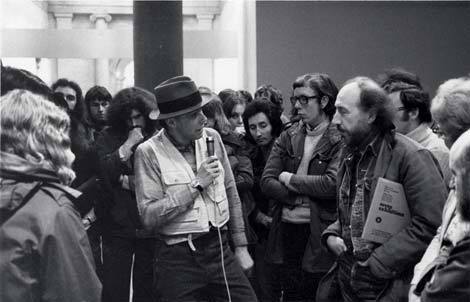Sometimes hundreds of millions of eyes are useful, Episode No. 1

Group IX / SUW, No. 1, The Swan, No. 1, 1914-1915, by Hilma af Klint (1862-1944)
RIGHT BEFORE THE DOT COM boom blossomed into peak irrational exuberance I wrote my master’s degree thesis called “The Almost Chosen Ones” about technogical anxiety and American religions. With an MA in hand, I left my job working at a technology R&D center and started working at a software product company in Austin, Texas. We didn’t know it at the time, but the bubble was about to burst, and the forecast was for storms.
This particular company had 12 million subscribers paying $15 to $20 a month for a service (I’m going to keep things intentionally vague). To use the service, you would launch a customized Web browser. Here’s the kicker, the part that’s critical to the whole thing: despite being very successful, despite annually recurring revenue in the billions, the service was not at all better or even different than what was offered by 100 similar companies at the time. It was a plain old service, just like all the others.
Why was it was more successful? Somewhere along the way, some clever people in business development had figured out that under the right conditions, Microsoft would be willing to pre-install this browser and place an alias to it on their desktop. When people bought a new Windows computer, a percentage of them would see that colorful icon on the desktop and launch that pre-installed browser. After a bit of marketing, they’d feel inspired to type their credit card number into a form field.
IT’S EASY
I was friends with the business development lead who negotiated the terms of the agreement with Microsoft. She would fly in from Seattle every few months to meet with people at the headquarters in Austin. During one of her visits I invited her and her boss over for dinner at my house. I grilled some fajitas, warmed the corn tortillas from El Milagro Tortilleria, and made some pico de gallo with peppers from my garden. We talked about work. I said something like “So, how on earth do you two convince Microsoft to put our icon on every single Windows desktop?”
“It’s easy. We give Microsoft a s&t ton of money,” my friend said.
I asked: “So Microsoft doesn’t own a rival service that they’d rather promote on every single desktop they sell in North America?”
“Not yet! But maybe we could sell the company to them.” She replied.
LESSONS
That night I learned an important lesson: even if your browser is not the system default if you get a browser icon in front of lots of people at the right time and place, your custom browser can succeed. It’s not that offering a differentiated or distinctive product and service doesn’t help, but without distribution even a demonstrably superior product will struggle.
IRRATIONAL MAN AND WOMAN
Traditional economists model humans as beings who are constantly making decisions based on “rationality,” meaning they carefully weigh all available information and options to make choices that maximize their personal benefit or utility. Cool, calm, and self-interested. But we must only look in the mirror to know that we are emotional and irrational. We buy lottery tickets, despite knowing that it is unlikely we will profit. We continue to punch the clock at difficult workplaces long after we have accrued more than enough money to do whatever we want. We spend $1,700 on 3 ounces of “anti-aging” facial cream which consists of 90 cents worth of humectants and emollients. We do not make perfectly rational decisions.
STATUS QUO BIAS
If you read Thaler and Sunstein and other behavioral economists, you know that there are quite a few human biases that perturb the orbit of the human decision-making process. Status quo bias is one of them. It refers to the tendency to accept a default, even if something better is available, costs nothing, and switching would take just a second. Another way to think about this is that convenience tends to trump quality or price.
When people buy a computer they tend to accept the defaults because they think “the manufacturer must have configured it this way because it is the best option for my computer.” If people see custom browser icon on the desktop and they’re aware that this browser offers a needed service, they think: “Maybe I could research a cheaper or better option for this service, but I trust the service will work on my computer. Plus, it’s convenient” and boom, you have billions in annually recurring revenue.
NEXT INSTALLMENT
In my next few posts I’ll write about the ummm…adventure we had when the Chief Product Officer was abruptly fired, and then a decision was made that we would re-think and re-invent the customized browser that was preinstalled on every Microsoft desktop in North America. We were asked to upgrade it technologically in order to offer a new and pricier service that would be better at motivating new users to stick around. This new, better browser and service would increase the lifetime value of each user, but something got in the way. Spoiler alert: it was a tabbed browser with a full productivity suite, and it predated Firefox, the “first tabbed browser.”
Read the next episode in this series: He said “All you have to do now is just write the code”




